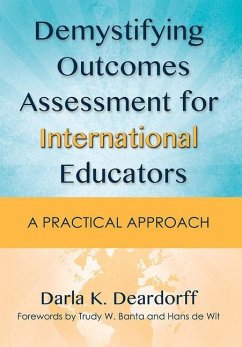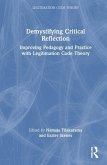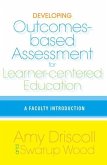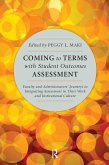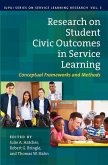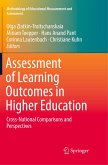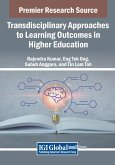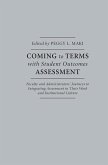- Broschiertes Buch
- Merkliste
- Auf die Merkliste
- Bewerten Bewerten
- Teilen
- Produkt teilen
- Produkterinnerung
- Produkterinnerung
This book is a practical guide to learning-outcomes assessment in international education for practitioners who are starting to engage with the process, as well as for those who want to improve the quality and effectiveness of their assessment efforts.
Andere Kunden interessierten sich auch für
![Demystifying Critical Reflection Demystifying Critical Reflection]() Demystifying Critical Reflection195,99 €
Demystifying Critical Reflection195,99 €![Developing Outcomes-Based Assessment for Learner-Centered Education Developing Outcomes-Based Assessment for Learner-Centered Education]() Amy DriscollDeveloping Outcomes-Based Assessment for Learner-Centered Education47,99 €
Amy DriscollDeveloping Outcomes-Based Assessment for Learner-Centered Education47,99 €![Coming to Terms with Student Outcomes Assessment Coming to Terms with Student Outcomes Assessment]() Coming to Terms with Student Outcomes Assessment47,99 €
Coming to Terms with Student Outcomes Assessment47,99 €![Research on Student Civic Outcomes in Service Learning Research on Student Civic Outcomes in Service Learning]() Research on Student Civic Outcomes in Service Learning57,99 €
Research on Student Civic Outcomes in Service Learning57,99 €![Assessment of Learning Outcomes in Higher Education Assessment of Learning Outcomes in Higher Education]() Assessment of Learning Outcomes in Higher Education112,99 €
Assessment of Learning Outcomes in Higher Education112,99 €![Transdisciplinary Approaches to Learning Outcomes in Higher Education Transdisciplinary Approaches to Learning Outcomes in Higher Education]() Transdisciplinary Approaches to Learning Outcomes in Higher Education225,99 €
Transdisciplinary Approaches to Learning Outcomes in Higher Education225,99 €![Coming to Terms with Student Outcomes Assessment Coming to Terms with Student Outcomes Assessment]() Coming to Terms with Student Outcomes Assessment197,99 €
Coming to Terms with Student Outcomes Assessment197,99 €-
-
-
This book is a practical guide to learning-outcomes assessment in international education for practitioners who are starting to engage with the process, as well as for those who want to improve the quality and effectiveness of their assessment efforts.
Hinweis: Dieser Artikel kann nur an eine deutsche Lieferadresse ausgeliefert werden.
Hinweis: Dieser Artikel kann nur an eine deutsche Lieferadresse ausgeliefert werden.
Produktdetails
- Produktdetails
- Verlag: Routledge
- Seitenzahl: 242
- Erscheinungstermin: 20. Februar 2015
- Englisch
- Abmessung: 229mm x 152mm x 13mm
- Gewicht: 357g
- ISBN-13: 9781620361283
- ISBN-10: 1620361280
- Artikelnr.: 40903838
- Herstellerkennzeichnung
- Libri GmbH
- Europaallee 1
- 36244 Bad Hersfeld
- gpsr@libri.de
- Verlag: Routledge
- Seitenzahl: 242
- Erscheinungstermin: 20. Februar 2015
- Englisch
- Abmessung: 229mm x 152mm x 13mm
- Gewicht: 357g
- ISBN-13: 9781620361283
- ISBN-10: 1620361280
- Artikelnr.: 40903838
- Herstellerkennzeichnung
- Libri GmbH
- Europaallee 1
- 36244 Bad Hersfeld
- gpsr@libri.de
Darla K. Deardorff is Executive Director of the Association of International Education Administrators and Affiliated Faculty at Duke University, Nelson Mandela University (South Africa), and at Shanghai International Studies University (China). Trudy W. Banta is professor of higher education and vice chancellor for planning and institutional improvement at Indiana University-Purdue University Indianapolis. She is co-author of Assessment Essentials and Making a Difference, and founding editor of the bi-monthly Assessment Update. Hans de Wit is distinguished fellow and professor emeritus of the practice in international higher education at the Center for International Higher Education (CIHE) at Boston College, USA. During 2015-2020, he was full-time director of CIHE. He is senior fellow of the International Association of Universities (IAU), based at UNESCO. Hans de Wit is founding member (1989) and past president (1993-1994) of the European Association for International Education (EAIE). He is the founding editor of the Journal of Studies in International Education (Association for Studies in International Education/SAGE), and consulting editor of the journal Policy Reviews in Higher Education (SRHE). He is associate chief editor of International Higher Education, and coeditor of the book series Global Perspectives in Higher Education (Brill/Sense). He has (co)written many books and articles on international(ization of) higher education and is actively involved in assessment and consultancy in international education, for organizations such as the European Commission, the European Parliament, UNESCO, the World Bank, and IAU.He has been director of the Centre for Higher Education Internationalisation (CHEI) at the Università Cattolica del Sacro Cuore (UCSC) in Milan, Italy, and professor of internationalization of higher education at the Amsterdam University of Applied Sciences. In 2005-2006, he was selected as a scholar of the Fulbright New Century
Foreword 1. Trudy Banta Foreword 2. Hans de Wit Acknowledgements Preface 1.
Framing International Education Assessment 2. Thirty Frequently Asked
Questions on Assessment in International Practice 3. The Unique Assessment
Context of International Education 4. Principles for Effective Assessment
in International Education 5. Approaching International Education
Assessment Holistically. The Logic Model 6. Getting Started 7. Developing
an Assessment Strategy. The Assessment Process 8. Pitfalls to Avoid,
Strategies and Lessons Learned 9. The Leadership Role in International
Education Assessment 10. The Future of International Education Assessment
APPENDICES Appendix A. Handouts and Worksheets Appendix B. Assessing
Intercultural Competence as a Learning Outcome of International Education
Appendix C. Some Thoughts on Assessing Intercultural Competence Appendix D.
Checklist for Evaluating the Effectiveness of Outcomes Assessment in
International Education Appendix E. Some Assessment Tools for International
Education Contexts Appendix F. International Education Learning Outcomes
Examples Appendix G. Selected Assessment Resources for International
Educations References Index
Framing International Education Assessment 2. Thirty Frequently Asked
Questions on Assessment in International Practice 3. The Unique Assessment
Context of International Education 4. Principles for Effective Assessment
in International Education 5. Approaching International Education
Assessment Holistically. The Logic Model 6. Getting Started 7. Developing
an Assessment Strategy. The Assessment Process 8. Pitfalls to Avoid,
Strategies and Lessons Learned 9. The Leadership Role in International
Education Assessment 10. The Future of International Education Assessment
APPENDICES Appendix A. Handouts and Worksheets Appendix B. Assessing
Intercultural Competence as a Learning Outcome of International Education
Appendix C. Some Thoughts on Assessing Intercultural Competence Appendix D.
Checklist for Evaluating the Effectiveness of Outcomes Assessment in
International Education Appendix E. Some Assessment Tools for International
Education Contexts Appendix F. International Education Learning Outcomes
Examples Appendix G. Selected Assessment Resources for International
Educations References Index
Foreword 1. Trudy Banta Foreword 2. Hans de Wit Acknowledgements Preface 1.
Framing International Education Assessment 2. Thirty Frequently Asked
Questions on Assessment in International Practice 3. The Unique Assessment
Context of International Education 4. Principles for Effective Assessment
in International Education 5. Approaching International Education
Assessment Holistically. The Logic Model 6. Getting Started 7. Developing
an Assessment Strategy. The Assessment Process 8. Pitfalls to Avoid,
Strategies and Lessons Learned 9. The Leadership Role in International
Education Assessment 10. The Future of International Education Assessment
APPENDICES Appendix A. Handouts and Worksheets Appendix B. Assessing
Intercultural Competence as a Learning Outcome of International Education
Appendix C. Some Thoughts on Assessing Intercultural Competence Appendix D.
Checklist for Evaluating the Effectiveness of Outcomes Assessment in
International Education Appendix E. Some Assessment Tools for International
Education Contexts Appendix F. International Education Learning Outcomes
Examples Appendix G. Selected Assessment Resources for International
Educations References Index
Framing International Education Assessment 2. Thirty Frequently Asked
Questions on Assessment in International Practice 3. The Unique Assessment
Context of International Education 4. Principles for Effective Assessment
in International Education 5. Approaching International Education
Assessment Holistically. The Logic Model 6. Getting Started 7. Developing
an Assessment Strategy. The Assessment Process 8. Pitfalls to Avoid,
Strategies and Lessons Learned 9. The Leadership Role in International
Education Assessment 10. The Future of International Education Assessment
APPENDICES Appendix A. Handouts and Worksheets Appendix B. Assessing
Intercultural Competence as a Learning Outcome of International Education
Appendix C. Some Thoughts on Assessing Intercultural Competence Appendix D.
Checklist for Evaluating the Effectiveness of Outcomes Assessment in
International Education Appendix E. Some Assessment Tools for International
Education Contexts Appendix F. International Education Learning Outcomes
Examples Appendix G. Selected Assessment Resources for International
Educations References Index

